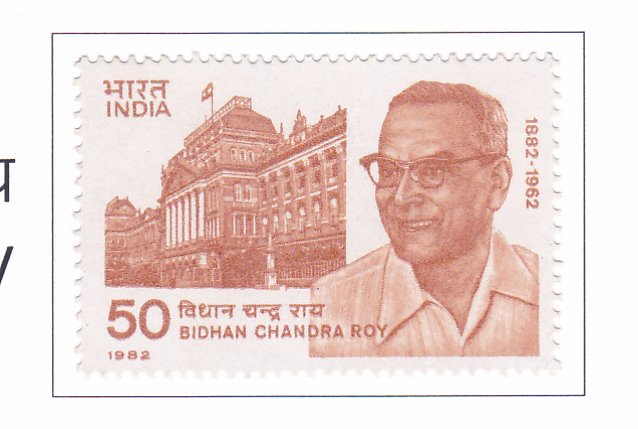Birth Centenary of Bidhan Chandra Roy (1882-1962)

Technical Data
| Stamp Set | Birth Centenary |
|---|---|
| Date of Issue | July 1, 1982 |
| Denomination | 50 p |
| Quantity | 2,000,000 |
| Perforation | comb 15 x 14 |
| Printer | Security Printing Press, Nashik |
| Watermark | No Watermark |
| Colors | Chestnut |
| Catalog Codes |
Michel IN 913 Stamp Number IN 964 Yvert et Tellier IN 724 Stanley Gibbons IN 1048 |
| Themes | Anniversaries and Jubilees | Buildings | Physicians | Politicians |
Dr. Bidhan Chandra Roy, born on July 1, 1882, in Patna, was a luminary whose contributions spanned the fields of medicine, education, and politics. After completing his early education in Patna, he pursued higher studies in mathematics and later joined Calcutta Medical College. He furthered his medical education at St. Bartholomew’s Institution in London, where he excelled and obtained prestigious qualifications.
Returning to India, Dr. Roy made significant contributions to medical education and practice. He served as Professor and Head of the Department of Medicine at Carmichael (now R.G. Kar Medical College) and later became its Emeritus Professor and Consulting Physician. He also held leadership positions in medical education societies, leaving an indelible mark on the healthcare landscape of Bengal.
Dr. Roy’s foray into politics began early, and he quickly rose to prominence. He contested and won against Sir Surendranath Banerjee in 1923, marking a dramatic entry into the political arena. He played a pivotal role in the Bengal Legislative Council, becoming Deputy Leader of the Swarajya Party after the demise of Chittaranjan Das.
His association with the Indian National Congress deepened over the years, and he worked closely with leaders like Mahatma Gandhi and Jawaharlal Nehru. Dr. Roy’s leadership extended to the Calcutta Corporation, where he served as an Alderman.
His tenure as Vice Chancellor of Calcutta University from 1942 to 1944 showcased his commitment to education. Dr. Roy’s political career reached new heights when he became the Chief Minister of West Bengal in 1948. His successive electoral victories in 1952, 1957, and 1962 underscored his popularity and effectiveness as a leader.
In 1961, Dr. Roy was honored with the Bharat Ratna, India’s highest civilian award, in recognition of his exemplary leadership and contributions. Tragically, he passed away on July 1, 1962, exactly eighty years after his birth. His legacy lives on as an architect of modern West Bengal, and his birth centenary was commemorated with a commemorative stamp by the Indian Posts and Telegraphs Department.
(Text adapted from material courtesy of the sponsors and published sources)
